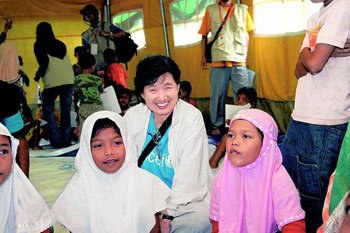Beautiful Scenery at Every Turn
Beautiful Scenery at Every Turn
Posted January. 07, 2006 03:00,

Lost Suitcase, by Park Wan-seo, is a collection of travel writing by a 75-year-old. The book covers various places, including domestic destinations such as Hahoe Village, Mt. Odae, and the Seomjin River, lands of famine and natural disasters such as Ethiopia, and other countries, such as China and the Vatican.
The writing dazzles the reader with scenery that is described as if drawn on paper, with warmth that could touch a broken heart, and with the kind of direct insight that sees through glorious cultures, finding pipe dreams. The authors writings are based on the trust that life is a journey through which people grow rather than accumulate experiences, that people are good by nature, and the belief that nature is harmonious with civilization.
Park displays a warm view towards her mother country, saying she misses the familiar landscape whenever she thinks about it. Depicting Jeolla Province, she writes, No mountain without plains, small or big, can be found. How lovely that commonplace towns seem like articulate pieces of work by God.
Parks writing on China, What a Good Place to Cry, is like a drama with her as the actual heroine. The writing is primarily about the story of how Park, writer Song Woo-hye, and historian Lee Yi-wha all cried when visiting the places where the independence army operated during Japanese colonial rule. This story consists of Parks recollection of the warm and friendly people, and this warms the readers heart.
How long has it been since I witnessed such a send off and such generosity? It reminded me of Gaesong station when I was a little girl. There were more people glued to the window of the train, not wanting to say goodbye, than there were people on the inside. I used to cry with my face attached to the window when I spotted my grandmother among the crowd.
Park visited Ethiopia as a Goodwill Ambassador of UNICEF. In the book, she wrote about some of the things that surprised her like her observations that people were all bones, children were extremely beautiful, and that they just smiled, not once begging for money or food. I carefully touched a child, who seemed to have nothing but skin on his bones. Suddenly, he opened his bright eyes and smiled at me. I was so surprised that I actually screamed.
The title story, Lost Suitcase, was written by the humiliated author as she imagines someone opening up her suitcase full of her underwear, which she lost by the airlines mistake. I believe that I have lived long enough. There are a number of worries when I think about leaving my house and my household goods. My last house could be the last suitcase of my life. Perhaps the most frightening of all would be to expose my spirit that was trapped in the suitcase of my body, to the bright light.
Ki-Tae Kwon kkt@donga.com







